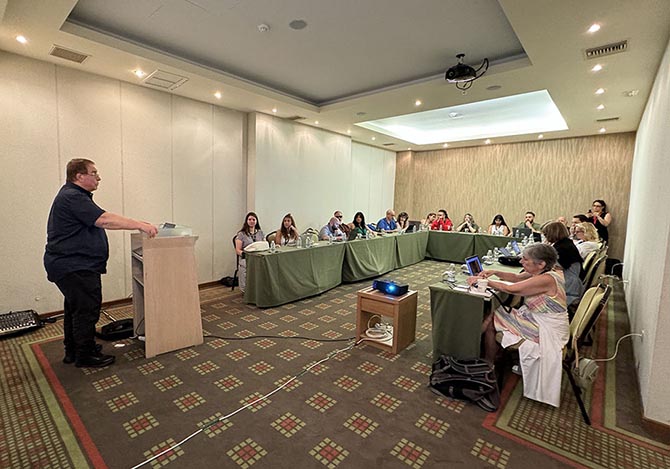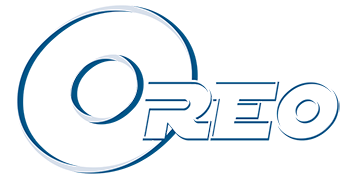

ICICTE 2025 will once again seek to address the many challenges and new directions presented by technological innovations in educational settings. As a premier gathering, ICICTE unites a diverse international community of scholars and practitioners in a stimulating forum. With a selective number of participants, the conference fosters opportunities for enriching discussions on cutting-edge applications of technology in education.
Through captivating keynote addresses, insightful plenary sessions, engaging workshops, and interactive forums, the conference delves into the seamless integration of technology across all facets of education. By providing a platform for intense interdisciplinary interaction and scholarly debates, ICICTE cultivates a nurturing environment for profound exploration and collaborative exchange.
This year's conference, situated in the enchanting realm of Crete, Greece, endeavors to invigorate dialogues encompassing alternative processes, procedures, techniques, and tools essential for crafting learning environments apt for the twenty-first century. Our aim is to kindle enthusiasm for exploring the latest trends and advancements in the dynamic field of Technology in Education.
We extend a cordial invitation to academics, researchers, educators, policymakers, and industry leaders to participate actively and contribute their expertise to this vibrant scientific gathering. By being part of ICICTE, attendees and sponsors alike will gain invaluable insights and a comprehensive understanding of contemporary practices and forward-thinking approaches in leveraging technology for education's ever-advancing landscape. Together, let us shape the future of education through the transformative power of information communication technologies.
Join us at ICICTE and immerse yourself in an intellectually stimulating and professionally rewarding experience that promises to chart the course for the future of education in the digital age.
General conference themes include:
- Digital Transformation in Education – Exploring the role of Information Communication Technologies (ICTs) in transforming educational practices, curriculum design, and learning environments.
- E-Learning and Online Education – Discussing innovative approaches, best practices, and challenges in delivering education through online platforms and e-learning solutions.
- Artificial Intelligence in Education – Analyzing the potential of AI and machine learning to enhance personalized learning, automate administrative tasks, and improve educational outcomes.
- Blended Learning and Hybrid Pedagogies – Investigating effective combinations of face-to-face and online learning methodologies to create engaging and inclusive learning experiences.
- Gamification and Serious Games in Education – Showcasing how gamification techniques and serious games can promote active learning, motivation, and skill development in students.
- Digital Equity and Inclusion – Addressing issues related to digital access, connectivity, and ensuring equitable opportunities for all learners, regardless of their background.
- Learning Analytics and Educational Data Mining – Examining the use of data-driven approaches to gain insights into student performance, behavior, and preferences, and using this information to inform instructional decisions.
- Educational Technology Adoption and Implementation – Discussing strategies for successful integration and adoption of ICTs in educational institutions, considering pedagogical, technical, and organizational factors.
- Open Educational Resources (OER) and Open Educational Practices (OEP) – Exploring the benefits and challenges of using open educational resources and encouraging the sharing of best practices through open educational practices.
- Emerging Technologies in Education – Presenting and discussing the potential impact of emerging technologies such as virtual and augmented reality, blockchain, and the Internet of Things (IoT) on education.
- Immersive Learning and Virtual Reality in Education – Exploring how immersive technologies can be harnessed to create engaging and interactive educational environments, enabling students to delve into virtual worlds and experiences that enhance their understanding and retention of complex concepts.
- Ethics and Research Integrity in Technology-Enhanced Education – Examining the ethical implications of integrating technology, including AI, into educational environments, including issues related to data privacy, security and consent. In addition, consideration of the responsibilities of educators, researchers and institutions to ensure ethical behaviour when using emerging technologies and data-driven methodologies.
Special themes
a) The Ethical Use of AI in Education

Featuring the OREO Project. As AI becomes a powerful tool in education, its ethical use is essential to ensure fairness, equity, and inclusivity. This theme, featuring the OREO project, will address the opportunities and challenges posed by AI in learning environments. Topics will include safeguarding student data privacy, reducing bias in AI algorithms, and the role of AI in personalized learning. The discussions will focus on how educators and institutions can adopt ethical frameworks to integrate AI responsibly into their classrooms, benefiting all learners.
b) Education for Sustainable Development

Featuring the MIRACLE Project. Education is the cornerstone of sustainable development. The MIRACLE project highlights the need to educate future generations about the interconnectedness of environmental, social, and economic systems. This theme will cover innovative teaching strategies, curriculum development, and real-world examples that promote sustainability in education. Participants will learn about best practices for integrating Sustainable Development Goals (SDGs) into lesson plans, as well as how to inspire students to take action toward a more sustainable future.
c) Educational Robotics for Environmental Education
.png?crc=146128945)
Featuring the RoboAquaria Project. The RoboAquaria project demonstrates the exciting potential of using robotics to teach environmental education. This theme will focus on how educators can use robotic technology to engage students in understanding ecological systems and sustainability concepts. Through hands-on activities, robotics can make environmental learning interactive and fun, helping students connect theory with real-world environmental challenges. Presenters will showcase examples of how robots can be used to simulate ecosystems, monitor environmental data, and encourage collaborative problem-solving among students.
d) Efficient Parenting in Times of Permacrisis

Featuring the Efficient Parenting Project. In an age of continuous global challenges, parents are often at the forefront of managing uncertainty. The Efficient Parenting Project is designed to help parents develop resilience and adapt to ongoing social, economic, and environmental crises. This theme will introduce the training and resources available for parents to support their families while actively participating in their communities. Topics will include resilience-building strategies, democratic involvement, and the use of an innovative e-learning platform to improve parenting skills and foster a supportive environment for children during times of crisis.


